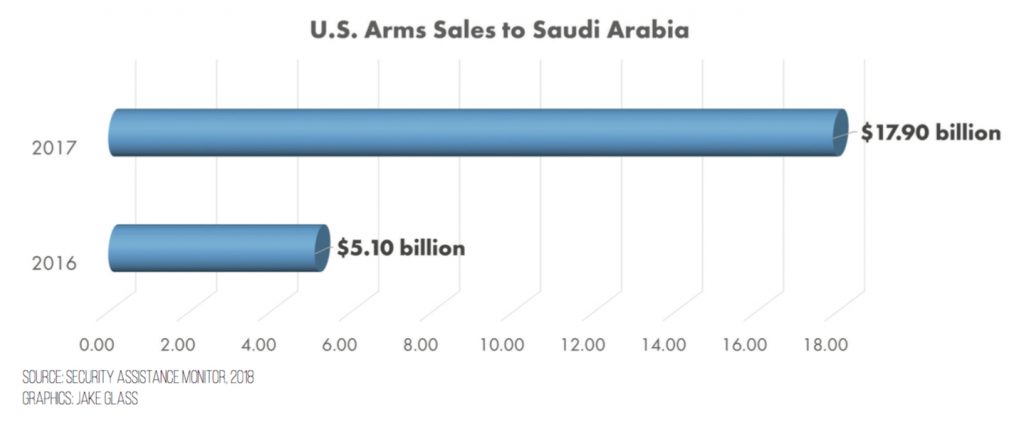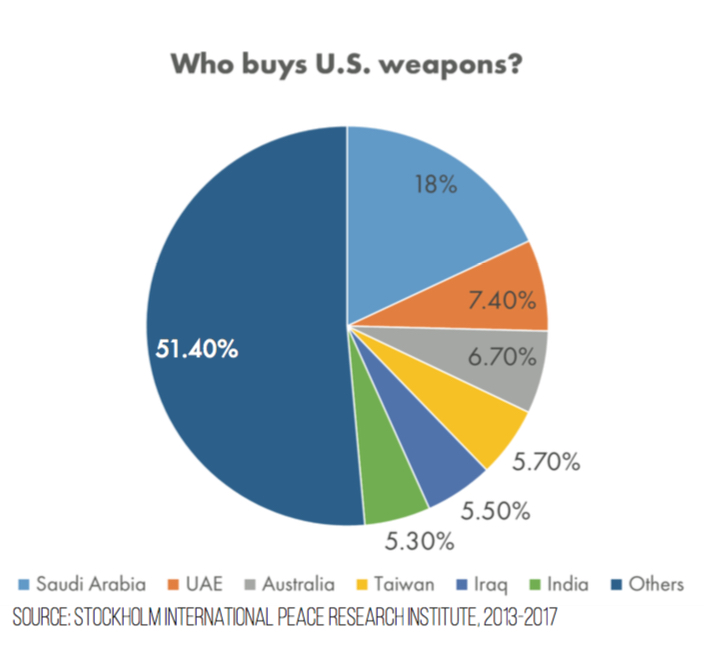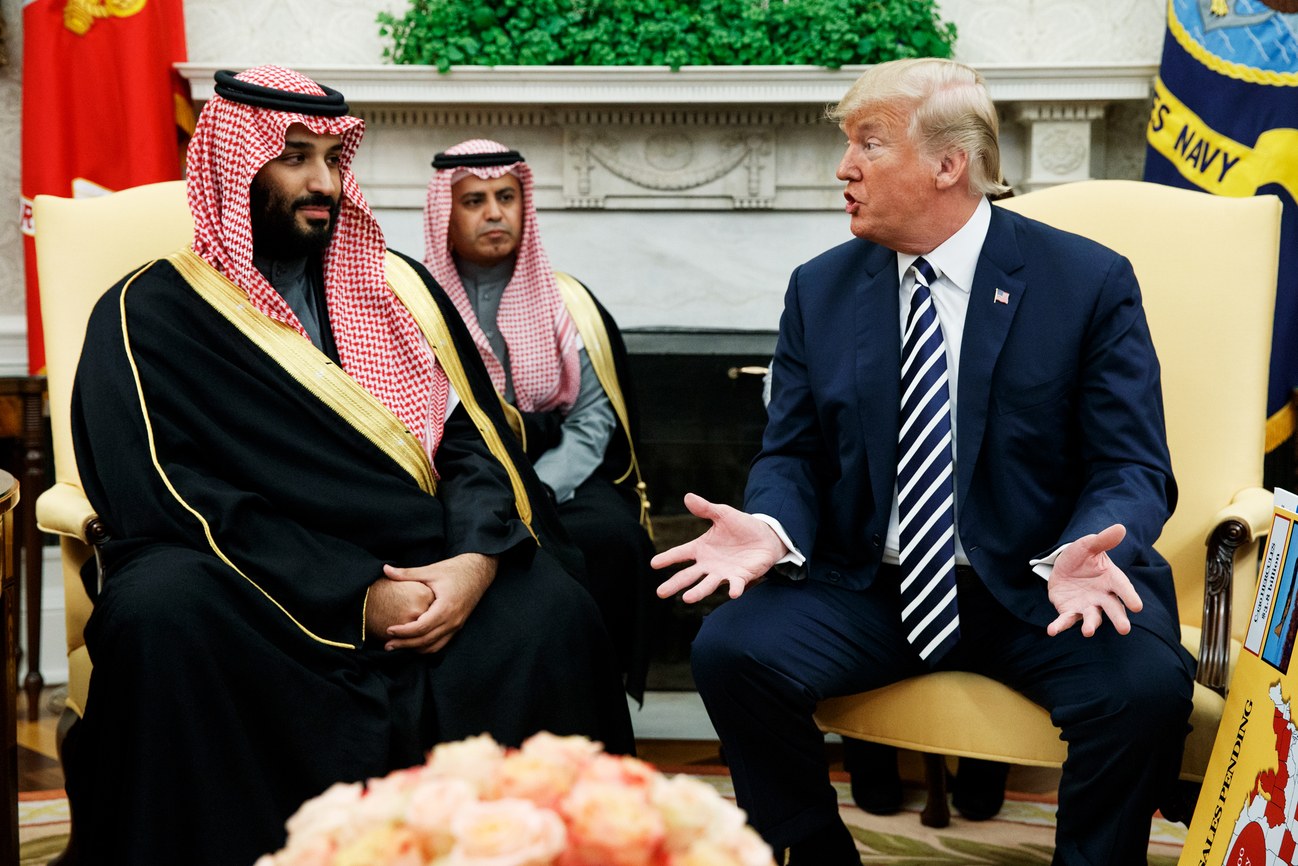On Oct. 2, journalist Jamal Khashoggi, a Saudi Arabian citizen and U.S. resident who frequently criticized the Saudi government, disappeared after visiting the Saudi Arabian consulate in Istanbul, Turkey. In the weeks since his disappearance, evidence has been brought forward that Khashoggi was murdered on the order of senior Saudi officials, possibly including Mohammed bin Salman, the Saudi crown prince. According to a New York Times report from Oct. 9, a group of Saudi agents murdered Khashoggi and gruesomely dismembered his body with a bonesaw, and U.S. intelligence intercepts obtained by the Washington Post found that bin Salman personally sought Khashoggi’s detainment.
By killing Khashoggi, the Saudi government is clear in its contempt for criticism and for a free press. But the murder is also another example of Saudi Arabia’s appalling record on human rights. Its intervention in the civil war in Yemen has caused what many experts and organizations call the world’s worst current humanitarian crisis. It has jailed known dissidents and reformers, and last year, bin Salman incarcerated over 200 government officials and royal family members, including Prince Alwaleed bin Talal, a major donor to Georgetown, for two months under the excuse of a corruption crackdown. Saudi Arabian women were finally allowed to drive this year, but women’s rights activists leading the charge were arrested throughout the course of their efforts. Women still require the consent of a male guardian to access a host of basic services. It is either custom or law for women to receive consent from their male guardian prior to acquiring an education, opening a bank account, getting married, or applying for a passport.
Saudi Arabia has done all of this while maintaining its position as one of America’s closest allies in the Middle East. In the course of this relationship and long before Khashoggi’s murder, though, the U.S. has overlooked Saudi Arabia’s human rights abuses. We believe the U.S. must end this alliance and regret that it took this murder to prompt its serious reconsideration.
After Khashoggi’s murder, American legislators called for an independent investigation into the killing and placed the blame squarely on the Saudi crown prince. On Oct. 20, 18 days after initial reports of Khashoggi’s disappearance and after repeatedly denying any connection to him, the Saudi government finally confirmed his death. The government alleges that Khashoggi died from injuries sustained after a fistfight involving over a dozen Saudi officials at the consulate, but after weeks of shifting stories and under fire from world leaders, bin Salman backtracked and officially denounced the attack on Oct. 24. According to CNN, officials could not provide any evidence to prove the Saudi Arabian government’s assertion, and the suspects in the investigation include some of bin Salman’s closest advisors. Trump has said that Khashoggi’s murder was a “coverup,” and that his administration will revoke visas for some Saudi Arabian officials allegedly involved in the murder. This backpedaling does not outweigh the administration’s leniency towards Saudi Arabia’s past abuses, and the president has said he is still opposed to ending arms sales to Saudi Arabia or cutting off friendly relations.
 It is through this issue—arms sales—that the U.S. has not only been complicit, but also an enabler, in Saudi Arabia’s worst human rights abuses.
It is through this issue—arms sales—that the U.S. has not only been complicit, but also an enabler, in Saudi Arabia’s worst human rights abuses.
The ongoing civil war in Yemen, where Saudi Arabia has been involved militarily since 2015, is the most immoral example of American support for the Saudi regime. U.S. officials, independent analysts, and the United Nations place total Yemeni deaths from the conflict at close to 50,000. Independent organizations have accused the Saudi government of war crimes in Yemen. The international NGO Save the Children said in September that over 300 civilians in Hodeidah, a coastal town in Yemen, had been killed over a period of three months. The nonprofit describes a gruesome scene where thousands of children have either been killed, lost limbs, or lost the ability to speak from the effects of landmines, airstrikes, or bombs. Blockades from the war have contributed to what the United Nations calls the world’s “worst famine in the last 100 years.” Limited access to clean drinking water, an already malnourished population, and unhealthy living conditions have caused a cholera outbreak that, according to World Health Organization estimates, has affected 1.2 million Yemenis and has killed approximately 2,000.
Not only is the U.S. continuing its alliance with Saudi Arabia during the campaign in Yemen, but the American government has provided the regime with much of the weapons and training used in the conflict. Saudi Arabia is the top recipient of American arms sales—in the 2017 calendar year, the United States sold them $18 billion worth of weapons. CNN reported that the bomb used in a a Saudi coalition airstrike that killed 51 civilians, including 40 children, on Aug. 9 was supplied by the United States. The Department of Defense refused to research whether U.S. bombs were used to kill civilians in Yemen, but further investigation by CNN discovered that a number of airstrikes that caused civilian deaths in the Yemeni civil war used weapons sold by American manufacturers. In addition, an analysis of government procurement documents by TYT Investigates found that the United States is training Saudi fighter pilots on American soil.
 The U.S. connection to Saudi Arabia did not begin under the Trump administration; rather, it is one that has remained strong for the past 70 years. Under former President Barack Obama, the United States made $115 billion in arms sales and training to Saudi Arabia, the most of any presidential administration in the last 70 years. Obama also provided intelligence assistance, in-air refueling capabilities, and other strategic services to the Saudi coalition participating in the conflict in Yemen. From Franklin Delano Roosevelt to Obama and now Trump, the U.S. has maintained a cozy relationship with Saudi Arabia, seemingly exchanging human rights concerns for a strong Middle Eastern ally.
The U.S. connection to Saudi Arabia did not begin under the Trump administration; rather, it is one that has remained strong for the past 70 years. Under former President Barack Obama, the United States made $115 billion in arms sales and training to Saudi Arabia, the most of any presidential administration in the last 70 years. Obama also provided intelligence assistance, in-air refueling capabilities, and other strategic services to the Saudi coalition participating in the conflict in Yemen. From Franklin Delano Roosevelt to Obama and now Trump, the U.S. has maintained a cozy relationship with Saudi Arabia, seemingly exchanging human rights concerns for a strong Middle Eastern ally.
While the American alliance with Saudi Arabia has generally received bipartisan support, critics in both parties have begun to question the sale of deadly weapons to a regime that has shown its disregard for human life. Even before the Khashoggi affair, some U.S. politicians attempted to halt the sale of arms to Saudi Arabia and end American complicity in the ongoing conflict. Last year, Sens. Chris Murphy (D-CT) and Rand Paul (R-KY) forced a vote on an amendment to halt a new weapons deal with Saudi Arabia. While the amendment was defeated 47 to 53 last year, fallout from the Khashoggi murder and international pressure from allies like Germany—which recently announced an end on its future arms sales with Saudi Arabia—may point to a future where the Senate steps up and refuses to arm the violent regime.
Indeed, the murder in the Saudi consulate may be turning the tide of elite opinion on the kingdom. In the weeks following the news of Khashoggi’s disappearance, American media, business executives, and government officials have announced their intentions to skip an annual business summit in Riyadh. The Washington Post, for where Khashoggi often wrote, told a Republican lobbyist who also serves as an opinion writer for the paper that he would no longer be able to contribute if he continued to lobby for Saudi Arabia.
But it should not have taken the murder of Khashoggi, as horrible as it was, for American elites to turn from Saudi Arabia, and it will take more than just pulling out of a business conference or denying an op-ed to a lobbyist to right the course. Amidst the changes in narrative and response to Khashoggi’s disappearance, one thing has remained constant: the suffering in Yemen. Children and innocent people continue to starve, die of cholera, and face relentless air attacks from the Saudi-led coalition. In the entirety of the war in Yemen, American weapons have aided Saudi Arabia in carrying out their war crimes and horrors in the country. It must stop.





